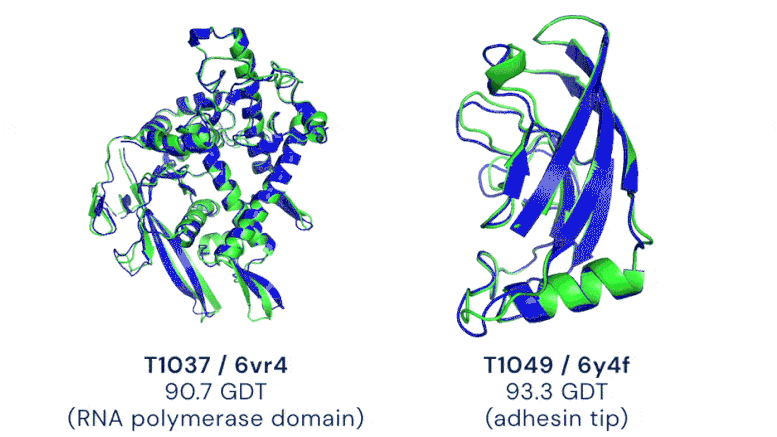
Participants must blindly predict the structure of proteins that have only recently — or in some cases not yet — been experimentally determined, and wait for their predictions to be compared to experimental data.
The ability to predict protein structures accurately enables a better understanding of what they do and how they work.
A major challenge is the astronomical number of ways a protein could theoretically fold before settling into its final 3D structure.Determining protein shapes and functions is a major field of scientific research, primarily using experimental techniques that can take years of painstaking and laborious work per structure, and require the use of multi-million dollar specialised equipment.
Now, DeepMind has developed new deep learning architectures for CASP14, drawing inspiration from the fields of biology, physics, and machine learning, as well as the work of many scientists in the protein folding field over the past half-century.
For the latest version of AlphaFold used at CASP14, DeepMind created an attention-based neural network system, trained end-to-end, that attempts to interpret the structure of this graph, while reasoning over the implicit graph that it’s building.
Additionally, AlphaFold can predict which parts of each predicted protein structure are reliable using an internal confidence measure.
DeepMind is excited to collaborate with others to learn more about AlphaFold’s potential, and the AlphaFold team is looking into how protein structure predictions could contribute to understanding of certain diseases with a few specialist groups.There are also signs that protein structure prediction could be useful in future pandemic response efforts, as one of many tools developed by the scientific community.Earlier this year, DeepMind predicted several protein structures of the SARS-CoV-2 virus, and impressively quick work by experimentalists has now confirmed that AlphaFold achieved a high degree of accuracy on its predictions.
But as with all scientific research, there’s still much to be done, including figuring out how multiple proteins form complexes, how they interact with DNA, RNA, or small molecules, and how to determine the precise location of all amino acid side chains.
As with its earlier CASP13 AlphaFold system, DeepMind is planning to submit a paper detailing the workings of this system to a peer-reviewed journal in due course, and is simultaneously exploring how best to provide broader access to the system in a scalable way.“This computational work represents a stunning advance on the protein-folding problem, a 50-year old grand challenge in biology.
“What the DeepMind team has managed to achieve is fantastic and will change the future of structural biology and protein research.
This leap forward demonstrates how computational methods are poised to transform research in biology and hold much promise for accelerating the drug discovery process.”.
“The ultimate vision behind DeepMind has always been to build AI and then use it to help further our knowledge about the world around us by accelerating the pace of scientific discovery.
“These incredible results are testament to DeepMind’s unique research philosophy — bringing together mission-focused, multidisciplinary teams to target ambitious scientific goals
Our team’s work demonstrates that machine learning techniques are finally able to meet the complexity of describing these incredible protein machines, and we are truly excited to see what new breakthroughs in both human health and fundamental biology it will bring.”
“The ability to predict high accuracy protein structures with AI could change how we approach biology, with potential applications in drug design and bioremediation
Read DeepMind AI Solution to a 50-Year-Old Science Challenge Could “Revolutionize Medical Research” for more on this topicBest-known for developing AlphaGo, the first program to beat a world champion at the complex game of Go, DeepMind has published over 1000 research papers — including more than a dozen in Nature and Science — and achieved breakthrough results in many challenging AI domains from StarCraft II to protein folding